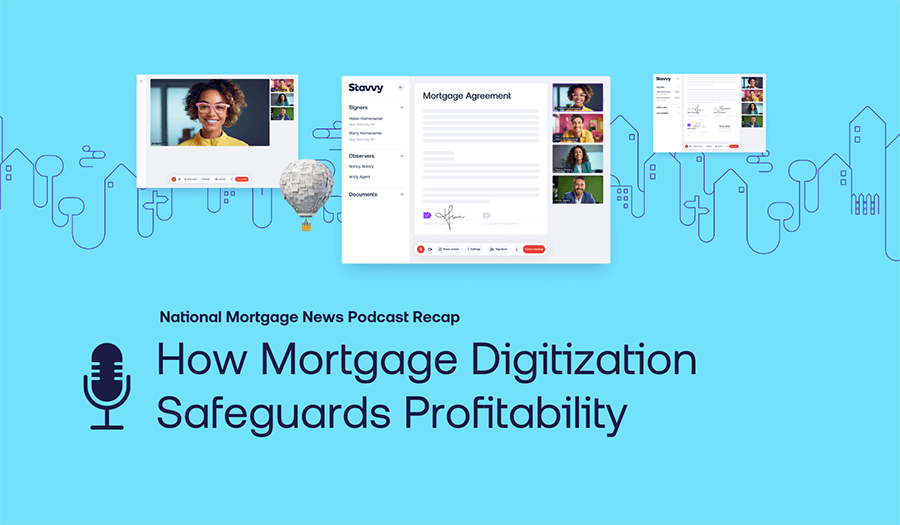Hybrid closing, also known as hybrid eClosing, is a popular option for mortgage lenders interested in digitizing the real estate closing experience. It improves operational efficiency for mortgage lenders, closing professionals, and borrowers by leveraging technology while maintaining the benefits of face-to-face interactions.
Hybrid closing is just one variety of eClosing among a range of options. Some mortgage lenders choose to offer full eClosing, while others prefer to scale and begin by offering hybrid eClosing. There is no one-size-fits-all approach and mortgage lenders should carefully consider the eClosing method that best fits their business model, operational workflows, and the needs of their borrowers.
This blog explores popular eClosing options and the benefits for both lenders and borrowers. Use it to help determine the eClosing option that best complements your mortgage lending business and your borrowers' needs.
What is eClosing?
eClosing, also known as electronic closing or digital closing, is a real estate closing where some or all closing documents are accessed and executed electronically.
eClosing gained popularity during COVID-19 by allowing real estate transactions to be executed securely despite social distancing restrictions. By leveraging technical features like eSign and remote online notarization (RON) to facilitate the real estate closing process, documents could be executed quickly and in a compliant manner without requiring face-to-face interactions. Although the height of the pandemic is behind us, the benefits of eClosing live on, from time and cost savings to a smoother and more modern closing experience.
eClosing a mortgage generally involves, at a minimum, a secure digital platform like Stavvy that supports the electronic presentation of closing documents, electronic signatures, and audio-visual technology for remote online notarization. In addition, eClosing can but does not have to result in an eNote. Lenders can adopt various eClosing methods to fit their business model, and Stavvy supports them with our flexible eClosing solution.
What is hybrid eClosing?
Hybrid eClosing is a form of closing where at least one of the required mortgage closing documents is executed using pen and paper. Typically, lenders adopt hybrid eClosing so borrowers can sign the non-notarized documents within a loan closing file electronically, leaving the documents that require notarization, like the security instrument, to be executed using pen and paper and in the physical presence of a notary.
For example, during hybrid eClosing, borrowers can securely sign closing disclosures, the loan estimate, and the completed loan application electronically before the closing date. During the in-person closing ceremony, the homeowner will review and sign the promissory note, security instrument, and any remaining notarized documents using pen and paper.
The option of electronically signing some documents before the scheduled closing saves time for everyone involved in the transaction. It also allows signers to review mortgage documents in advance and pre-emptively raise questions, issues, or concerns before closing day.
Example of a hybrid eClosing workflow
A hybrid eClosing can take many forms depending on your workflow, preferences, and technology platform. For the sake of explanation, we're sharing one possible hybrid eClosing scenario below:
- Signers receive non-notarized closing documents from the mortgage lender electronically with instructions for eSign.
- The signers electronically sign the identified closing documents before the in-person closing ceremony, including the mortgage note if the lender opts for an eNote.
- The remaining closing documents are presented to the borrowers for wet signature during the in-person closing ceremony and witnessed by a notary.
Now that we’ve covered the basics of eClosing and hybrid eClosing, here are three additional varieties of eClosing within those categories.
Hybrid eClosing with eNote
Hybrid eClosing with eNote is a mortgage closing process where the promissory note is included as part of the documents that are signed electronically. It must be executed in a platform that meets the security and compliance requirements for the executed note to be a transferable record and a MISMO®-compliant SMART Doc® eNote. A critical component of eNote creation is the addition of a tamper-evident seal that provides an extra layer of security. This accelerates electronic delivery to the secondary market, preventing delays often associated with physical notes. From there, the eNote can be stored in a secure, compliant eVault and managed across the asset’s entire lifecycle.
eClosing with IPEN
eClosing with IPEN is the mortgage closing process where notarized documents within a closing file are accessed, signed, and notarized electronically during a closing ceremony in the physical presence of a notary who uses technology to apply a digital notarial seal to the signed documents. This form of eClosing allows lenders to choose whether the borrowers can sign the non-notarized documents before or during the closing ceremony concurrent with the notarized documents. eClosing with IPEN typically involves creating an eNote, thereby providing lenders with additional post-closing efficiency.
eClosing with Remote Online Notarization
eClosing with RON is the most convenient method of eClosing where the notarized documents within a mortgage file are signed and notarized remotely, allowing all parties to meet virtually using audio-visual technology. Much like an eClosing with IPEN, the platform allows the notary to apply a digital notarial seal to the digital documents upon execution.
Loan origination system (LOS) integration
Offering a hybrid eClosing option begins with a seamless integration to your organization’s loan origination system. In doing so, the various technical features of eClosing (eSign, eNote, eVault, RON, and IPEN) can be added harmoniously to existing workflows. Creating an end-to-end integration eliminates the need to support separate tools from multiple vendors and can help eliminate barriers to adopting the new technology.
Stavvy’s bidirectional integration to the Encompass® by ICE Mortgage Technology® platform integrates eClosing features, delivering an intuitive experience for mortgage lenders to execute hybrid or fully digital closings. Stavvy’s comprehensive suite of digital closing features is accessible without leaving Encompass®, further simplifying the mortgage eClosing process. It facilitates real-time collaboration between mortgage lenders, closing professionals, and borrowers, ensuring that all documents are fully executed and synced to Encompass®.
What are the benefits of hybrid eClosing for mortgage lenders?
Hybrid eClosing benefits both mortgage lenders and the borrowers they serve. It creates efficiency for lenders by:
- Expediting time-to-close
- Facilitating collaboration with closing professionals
- Reducing error rates
- Lowering operational costs
In addition, it provides borrowers with flexible digital closing options, time savings, and an improved customer experience. From fewer physical documents to sign on closing day to more time to review and comprehend each mortgage closing document, hybrid eClosing requires less time, resources, and paper than a traditional, in-person closing.
Contact us to learn about the benefits of hybrid eClosing for your mortgage lending business. Experience how Stavvy is moving real estate beyond documents.



![[Webinar Recap] Advancing Your Digital Default Servicing Strategy](https://blog.stavvy.com/hubfs/advancing-your-digital-default-servicing-strategy-blog-recap.png)